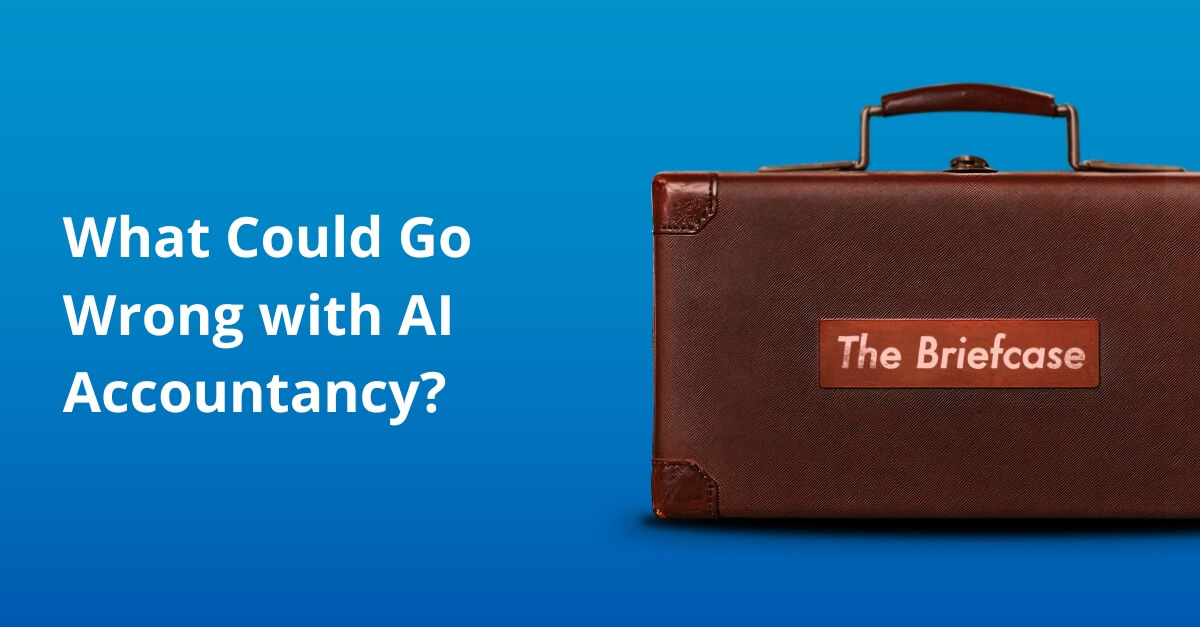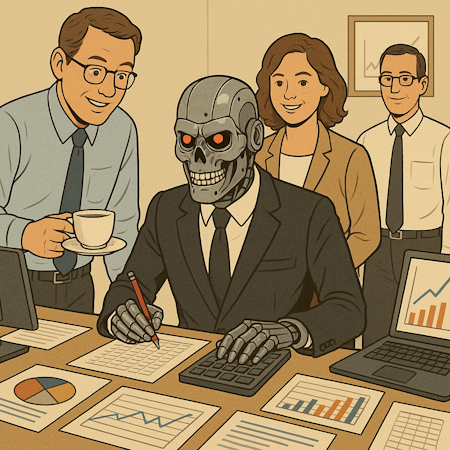When we first heard about the rise of AI, we all thought of The Terminator, not an accountant. But if an accountant is wearing a leather jacket, sunglasses, and riding a motorcycle, they’re not an unstoppable killing machine – they’re just having a midlife crisis.
Now it’s 2025, and accountants are still having midlife crises. We’re not here to talk about that, though. We’re talking about the other thing – the rise of AI thing. Right now, ChatGPT is writing reports, suggesting tax strategies, and confidently hallucinating fake financial legislation.
Yes this image was made by an AI. Terrifying stuff...
What could go wrong?
So far so good, right? But actually there’s the potential that things might go wrong! Let’s kick off with some doom.
- We could all lose our jobs
Job loss anxiety is, understandably, top of the list. AI is already capable of doing the kinds of tasks that junior accountants and support staff once cut their teeth on – stuff like data entry, reconciliations, and even basic forecasting. It’s hard to get on the career ladder if the first few rungs are taken. - Overtrusting the machine
An AI can write a beautifully formatted report that is 100% confident and 0% correct. If the bot says "approve the expense”, who’s legally responsible when it turns out to be for a gold-plated hot tub? - Data security
Financial data is sensitive, and training AI on that data is a GDPR nightmare. - Hallucinations
Last summer, a taxpayer attempted to dispute HMRC’s claim that he owed them over 10 grand. He referenced three cases that set a precedent in his favour. The issue was that ChatGPT had completely invented these cases, and the judge told him off for his laziness. - Bias in algorithms
AI has had some problems with racism in the past, so it’s maybe not a great idea to rely on it for, say, help hiring people. - We make a robot Chancellor of the Exchequer and it allocates the entire budget to AI R&D
Okay, this one is slightly more farfetched, but you can’t definitely say it won’t happen, and in a way it probably will.
What could go right?
Of course, not every AI outcome leads to a robot uprising.
AI has the potential to make accountancy faster and more accurate by removing the drudge work and freeing professionals up for strategic, advisory roles.
- We could all lose our jobs
Who needs a job anyway? With AI doing all the work, it could be a permanent holiday for folks like us. At the very least, we might get a four-day working week.
Unfortunately, that’s a crazy pipedream. In reality, AI can automate repetitive tasks, freeing us up to do more interesting work, rather than us doing less work. But, on the plus side, it’s the kind of work that requires actual judgment, creativity, and emotional intelligence – a bit more interesting than the boring routine stuff. - Fewer mistakes
AI doesn’t get distracted or tired, so it doesn’t misplace decimal points after three cups of coffee and a badly timed fire drill. Used correctly, AI can reduce human error and flag anomalies in a split second. - More inclusive client support
With automated tools, firms can offer affordable services to smaller clients who may have previously been priced out. AI helps scale personalised advice and support, which means accountants can provide a bit of help to the little guy – before of course returning to the far more important big guy. - It makes accountants more human
AI can crunch the numbers, but it can’t replace relationships. By offloading repetitive work, accountants have more time to connect with their clients and, most importantly, their teams. A bit more small talk and a relaxed atmosphere can stop you counting down the hours to Friday on a Sunday evening. - We make a robot Chancellor of the Exchequer and it fixes the country
Sure, the secondmost important politician runs on Amstrad, and yes, he’s reeling out printer paper as he delivers the Budget, but this version of events might be the only conceivable way we actually get some radical tax reform.
The Iron Chancellor 2.0
So, who’s regulating this?
As an old man once said, "with great power comes great responsibility”. So, it’s good to know that governments are regulating this deluge of AI. Which they are doing, right? Well, let’s see!
- European Union: The AI Act
The most advanced piece of legislation in the world right now. It classifies AI systems based on risk, from "unacceptable” to "minimal.” Tools used in finance or HR are likely to fall under "high risk”, which means tight controls and big penalties for misuse. - United Kingdom: The 5-Point Framework
The UK’s approach is more "flexible”. It focuses on five principles: safety, transparency, fairness, accountability, and contestability. It’s non-statutory, which means it’s more like advice than commandment. It’s hard to call it regulatory at all, to be honest! - Australia: 8 AI Ethics Principles
Down under, they’ve published voluntary ethical principles – including privacy, fairness, and human-centred values. It’s about encouraging good behaviour rather than punishing bad. A hippy parent’s approach.
🧠 Final thoughts
AI in accountancy isn’t just coming – for better or worse, it’s already here. And like every major shift, it comes with risks and rewards, and a lot of noise in between.
For some, it’s a threat. For others, it’s a once-in-a-career opportunity to refocus their work around strategy, advisory services, and human connection.
But it’s all about getting the balance right. We don’t want to fall by the wayside by ignoring AI, but it’s also not a great idea to plunge everything we have into it. There’s still a lot of hype, and a lot of doomsaying.
But until AI stops deciding to throw a load of random numbers and facts in for no reason – and that may never happen – you’re still going to be at the helm.



You need to sign in or register before you can add a contribution.